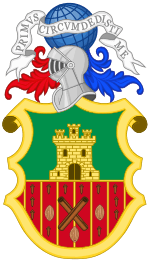Spanish ship Juan Sebastián Elcano
.jpg) Elcano in Pontevedra | |
| History | |
|---|---|
| Name: | Juan Sebastian de Elcano |
| Namesake: | Juan Sebastián Elcano |
| Operator: | Spanish Navy |
| Ordered: | 17 April 1925 |
| Builder: | Echevarrieta y Larrinaga yard, Cadiz, Spain |
| Cost: | 8,189,532,28 pesetas[1](€49,220)[2] |
| Launched: | 5 March 1927 |
| Commissioned: | August, 1928 |
| Maiden voyage: | 19 April 1928 |
| Homeport: | Cadiz, Spain |
| Identification: |
|
| Status: | Active |
| Notes: | training ship |
| Badge: |
 |
| General characteristics | |
| Displacement: | 3673 tons |
| Length: | 113 m (371 ft) |
| Beam: | 13.11 m (43.0 ft) |
| Height: | 48.5 m (159 ft) |
| Draft: | 7 m (23 ft) |
| Sail plan: | four-masted barquentine; 21 sails, total sail area of 2,870 m2 (30,900 sq ft)[3] |
| Speed: |
|
| Complement: | 300 sailors, 90 midshipmen |
| Armament: | 2 × 57 mm ceremonial gun mounts |
| Notes: |
Line art of Juan Sebastián de Elcano  |
Juan Sebastián de Elcano is a training ship for the Royal Spanish Navy. It is a four-masted topsail, steel-hulled barquentine (schooner barque). At 113 metres (371 ft) long, it is the third-largest tall ship in the world, and is the sailing vessel that has sailed the furthest, covering more than 2,000,000 nautical miles (3,700,000 km; 2,300,000 mi) in its history.
It is named after Spanish explorer Juan Sebastián Elcano, captain of Ferdinand Magellan's last exploratory fleet and the man who completed the first circumnavigation of the world. The ship also carries the Elcano coat of arms, which was granted to the family by Emperor Charles I following Elcano's return in 1522 from Magellan's global expedition. The coat of arms is a terraqueous globe with the motto "Primus Circumdedisti Me" (meaning: "First to circumnavigate me").
Build and design
'Juan Sebastián de Elcano' was built in 1927 in Cadiz, Spain, and its hull was designed by the naval architect Mr C E Nicholson of Camper and Nicholsons Ltd of Southampton. Constructed by Echevarrieta y Larrinaga shipyard[4] in Cadiz. After the proclamation of the Second Spanish Republic in April 1931 the ship became part of the Spanish Republican Navy.
In 1933 under Commander Salvador Moreno Fernández's order, a series of improvements were made to the ship and the bronze plate with the Latin language inscription Tu Primus Circumdedisti Me was placed near the prow. At the time of the coup of July 1936 Juan Sebastián Elcano was at Ferrol, a harbor that had been taken by the Nationalist faction. Its plans were used twenty-five years later to construct its Chilean sail training vessel sister ship Esmeralda in 1952-1954.
Maiden voyage
Its first voyage was sea testing between April and July that year from Cádiz to Malaga, with King Alfonso XIII on board as a passenger, and then on to Sevilla, Las Palmas, Tenerife, San Sebastián, Cádiz, São Vicente, Cape Verde, Montevideo, Buenos Aires, Cape Town, Adelaide, Melbourne, Sydney, Suva, San Francisco, California, Balboa, Panama, Havana, New York City, Cádiz.[5]
Naval Commanders of Juan Sebastián Elcano
Commanders that have been in charge of Juan Sebastián Elcano for crossings and instruction.[6]
|
|
See also
- Fernando Villaamil, and his circumnavigation in 1892-1894 commanding the Nautilus training ship.
- Ferrol
- Spanish Naval Academy In modern times, Institution where the Spanish Armada (i.e.: Spanish Navy) officers and other personnel receive their education.
- El Galatea (also known as Glenlee) From 1922 till 1969 she was the Training Tall Ship for the Spanish Navy in Ferrol (North-western Spain).
- El Club Naval de Ferrol Originally designed for the amusement of the Spanish Navy personnel and their families posted to the Naval Station of Ferrol.
- Structure of the Spanish Navy in the 21st century
- List of large sailing vessels
- List of schooners
References
| Wikimedia Commons has media related to Juan Sebastián Elcano. |
- ↑ "Juan Sebastián Elcano" - Astilleroscadiz.buques.org
- ↑ History summary of the ship Juan Sebastián de Elcano
- ↑ Technical details Archived 2010-11-25 at the Wayback Machine.
- ↑ Sailing Ship Rigs and Rigging, H A Underhill, p.50
- ↑ History summary of the ship Juan Sebastián de Elcano
- ↑ Relación de Comandantes de J. S. de Elcano en sus cruceros de instrucción|autor. Ministerio de Defensa|fechaacceso